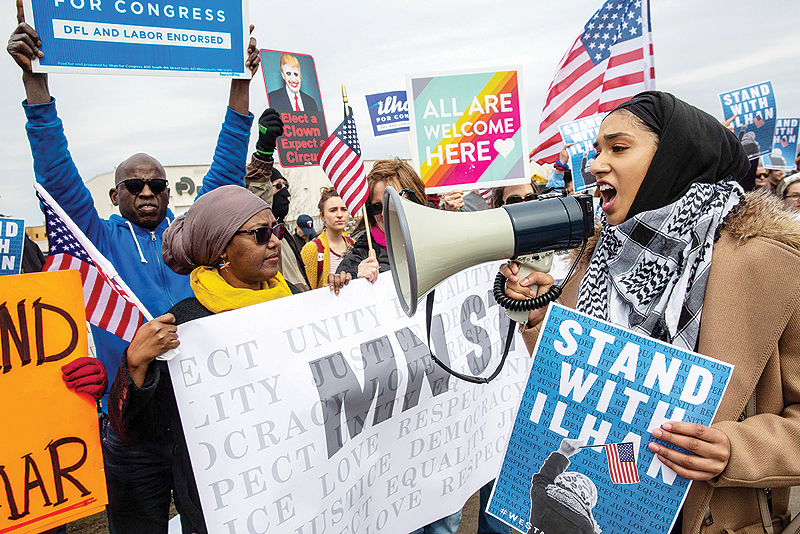WASHINGTON: A former refugee and the first black Muslim woman elected to Congress, Ilhan Omar embodied the American dream in her November victory but faces controversies fueled by her own words and President Donald Trump's hostility toward her. Omar's win was celebrated as historic, and her arrival in Washington contributed to the appreciation that Congress was finally becoming a more diverse, representative American institution. Now she is receiving daily death threats.
Since her January swearing-in, the 37-year-old Minnesota Democrat has been at the center of a swirling debate about anti-Semitism, discrimination and the role of an outspoken first-year congresswoman who challenges the White House and makes her own party's leadership chafe. Omar's remark that US political backing for the Jewish state is fueled by money from a pro-Israel lobbying group, and her open support for a boycott and divestment movement against Israel led to vocal criticism from both sides of the political aisle.
Earlier this month, she acknowledged becoming a lightning rod, telling late-night talk show host Stephen Colbert that identity politics has made immigrants, refugees, women of color and Muslims the focus of intensifying national controversy. "I just happen to embody all of those identities," Omar said on Colbert's CBS show last week.
Belligerence against the lawmaker has ramped up dramatically after a clip emerged of her characterizing the Sept 11, 2001 attacks in the United States as "some people did something". On Friday, Trump tweeted a video that juxtaposed the snippet - which some Democrats say was taken out of context - with images of the hijacked planes crashing into the World Trade Center's Twin Towers in New York.
Omar said Sunday in a statement that many of the increased threats she had received were "directly referencing or replying to the president's video". Trump's startling tweet prompted House Speaker Nancy Pelosi, the most high-ranking Democrat in the country, to denounce his "hateful and inflammatory rhetoric" and demand he take the video down, as she ordered a security review to safeguard Omar and her family.
Even before Trump's post, a man was arrested April 5 and charged with threatening to murder Omar, after he called her office and said "I'll put a bullet in her (expletive) skull," according to Omar's statement. The threats on social media were equally graphic. "She needs to be executed," one Twitter user wrote.
The president, perhaps believing that making her the progressive face of the Democratic Party will help rally his base in the early stages of his 2020 re-election bid, maintained the pressure Monday, tweeting that Omar is "out of control". Democratic leaders "should look at the anti-Semitic, anti-Israel and ungrateful US HATE statements Omar has made," he added.
Seizing on a chance to target Omar anew, Trump held a roundtable near Omar's Minneapolis, Minnesota congressional district. The subject was the economy, but Trump strayed into immigration politics as he criticized the US asylum process and called for an end to the visa lottery. "Who do you think these countries are giving us? They're not giving us their finest, that I can tell you," Trump said.

Opposing groups of protesters gathered outside the venue, including Trump opponents who held "Stand with Ilhan" placards. Many Democrats have rushed to Omar's defense, among them multiple 2020 presidential candidates. "The disgusting and dangerous attacks against her must end," tweeted Senator Bernie Sanders, a frontrunner for the Democratic nomination. Some 200 Democratic activists, teachers, local officials and Jewish and Muslim leaders signed a statement of solidarity with Omar and demanded an end to the attacks.
Omar was just eight years old when she and her family fled Somalia's civil war. As a refugee in America, a teenage Omar arrived in the big city of Minneapolis, where she rose to become a Democratic member of the state assembly. Last year, she won the Democratic nomination for her congressional race in a district that has not been represented by a Republican in half a century. The lack of serious conservative opposition in that race perhaps helped lead to her wake-up call when she landed in Washington.
"This whole process has really been one of growth for me," she told Colbert. But Omar, who is married, has three children and is the only member of Congress to wear a religious headscarf in the House chamber, has pushed back hard on the "offensive" accusation that her religion and refugee past make her less of a US citizen. "I took an oath to uphold the Constitution," she said. "I am as American as everyone else is." - AFP
.jpg)



